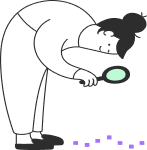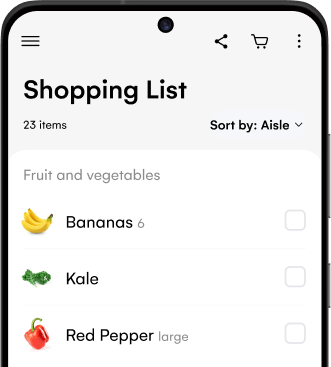Potatoes are undeniably one of the most loved foods worldwide. Whether they’re mashed, fried, or baked, these starchy delights have a special place in our hearts. Aaaand our bellies. But have you ever wondered if a potato is a vegetable? Can you count it as one of your five a day? Or is a potato a starch? Maybe it’s both?!
Don’t lose your grocery list with a free Samsung Food Account

The Dilemma: Is Potato a Vegetable?
When it comes to defining vegetables, things can get a little tricky. While many of us consider vegetables to be those green, leafy things that our parents told us to eat, the truth is, the world of vegetables goes far beyond that. Botanically speaking, vegetables can be classified into various categories, including fruits, flowers, stems, leaves, and roots. And that’s where the potato comes into play. As an underground tuber, it falls under the root category. So, technically, you could consider a potato a vegetable. But should you?
Let’s look more at potatoes specifically. You’re going back to high school biology here!

What Makes a Potato
To understand why potatoes are classified as vegetables, let’s take a closer look at their anatomy. Potatoes grow as part of the plant’s root system, which is usually found underground. Unlike fruits that develop from flowers, potatoes sprout from the plant’s swollen underground stem structures known as tubers. These tubers are rich in starch and carbohydrates, making them a great energy source for both humans and animals.
So, while they may not fit the traditional image of a vegetable, potatoes definitely have a rightful place in the veggie family. Basically, yes. Potatoes are vegetables. And a potato does count as one of your vegetable servings. They’re just starchy vegetables. But that doesn’t mean they’re bad! Butternut, corn, and beets are other examples of starchy veggies.
Nutritional Value
We’re often told that low carb diets are the best way to stay healthy. But that’s not necessarily true. Potatoes, despite being starchy, offer numerous health benefits. They are packed with essential nutrients like vitamin C, potassium, and dietary fiber. Vitamin C is known for its immune-boosting properties, while potassium helps regulate blood pressure.
Discover Samsung Food user top recipe categories

On top of that, potatoes are naturally low in fat and relatively low in calories too. This them a healthier alternative to some other carbohydrate-heavy foods. However, it’s worth mentioning that the way potatoes are prepared can significantly impact their nutritional value. Boiling or baking potatoes without adding excessive fats can help retain most of their nutrients. Whereas deep frying them, on the other hand, may diminish some of their health benefits. So while baked potatoes are a great addition to a balanced diet, chips and fries shouldn’t be eaten too often or in huge amounts. But that shouldn’t stop you from eating them from time to time and enjoying them without guilt.

There You Have It: A Potato is a Vegetable
In the great debate of whether a potato is a vegetable or not, the answer lies in its botanical classification as a root tuber. So yes, potatoes are technically vegetables. Although it might not fit the conventional image of a vegetable, potatoes offer valuable nutrients, versatility in the kitchen, and a whole lot of yumminess.
Whether we call it a vegetable, a root crop, or a tuber, what truly matters is that potatoes are a versatile and delicious addition to our meals. Next time you sink your teeth into a crispy french fry or savor a potato salad, remember that this spud might not be green and leafy, but it’s definitely a delightful member of the vegetable world!


